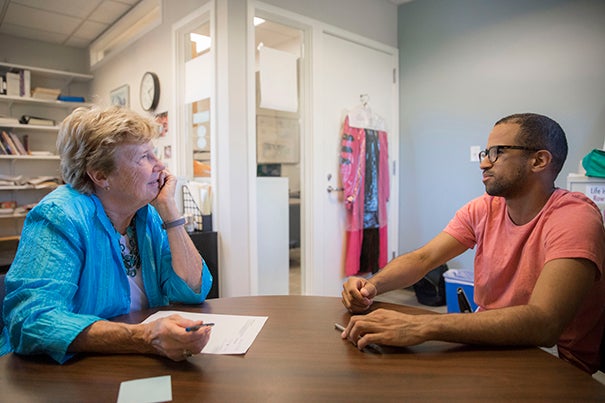
Caetano Hanta-Davis ’18 meets with Katherine Merseth, Senior Lecturer on Education during her office hours in Longfellow Hall.
Office hours: 6 realities
Professors value them, students sample them, and technology expands them
In a time-honored academic ritual, professors tell their students at the start of each semester to visit them during regular office hours, whether to seek academic advice or just to say hello.
Over the years, office hours, that academic institution established to foster deeper relationships between students and professors, have taken some fresh forms. Along with staffing regular hours, some professors talk with students while walking around campus, and a few invite students to catch up outside the office. Many use Skype to reach students.
Yet the reality is that not many students regularly visit offices, though more tend to show up during the weeks of midterms or final exams. So professors may spend much of that scheduled time catching up on emails, writing articles, and preparing for classes.
Professors often ask students to email them to book appointments. But in a tech-dominant world, they are increasingly turning to Doodle polls, Google spreadsheets, or sites such as calendy.com or wikispaces.com to book sessions. In September, CS50, the popular introductory course to computer science, began offering virtual office hours, during which teaching fellows chat with students and use software to connect with students’ computers remotely.
To understand how the traditional practice works now, the Gazette contacted six professors for their comments on office hours, the institution and the reality.
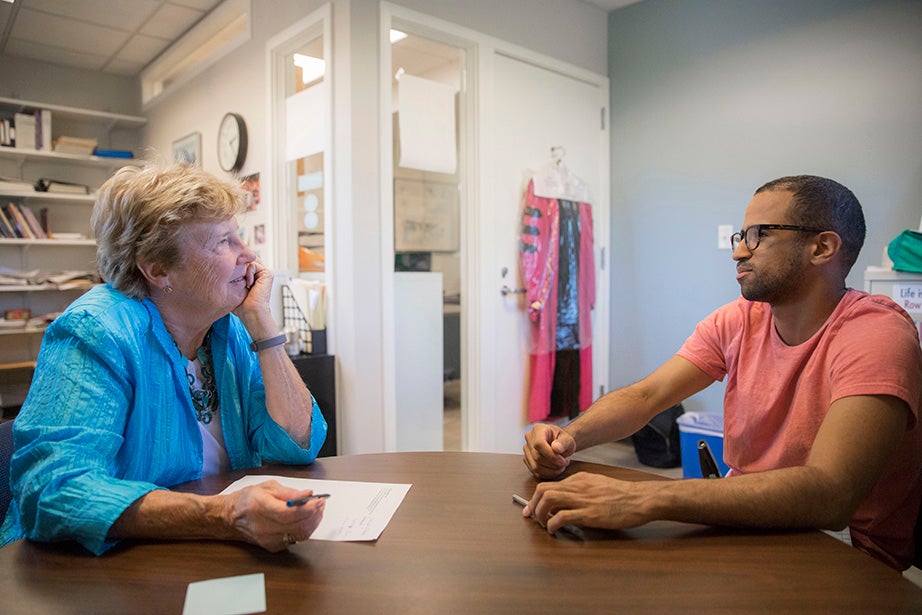
Katherine Merseth
Senior lecturer on education at the Graduate School of Education
Website: Katherine Merseth
Office: Longfellow 305
Office hours arrangement: Sign up via Wikispaces Classroom
At the heart of the undergraduate experience are relationships with others.
“Each week I have somewhere between 10 and 15 students come to office hours. I post them and students sign up. We talk for 20 minutes about the class or about anything that is on their minds.
I see office hours as an important method to get to know my students, and that helps me teach better.
I suspect students don’t come to office hours because they don’t think they are worthy of the professor’s time, or they have attended an office hour and the faculty member was not very welcoming. They feel like they are imposing.
At the heart of the undergraduate experience are relationships with others. Office hours are a way for professor and student to communicate outside of the pressure and sometimes hurried nature of a class. To persuade students to come to office hours, professors can invite students genuinely, and also post their office hours in a way that students can easily sign up. If a student has to call a staff assistant or the professor, that sometimes is too big of a hurdle. I announce in my class several times that I have time to see them, and that I think it is important. Over the last few years I would say that 90 percent of my students have come to see me.”
* * *
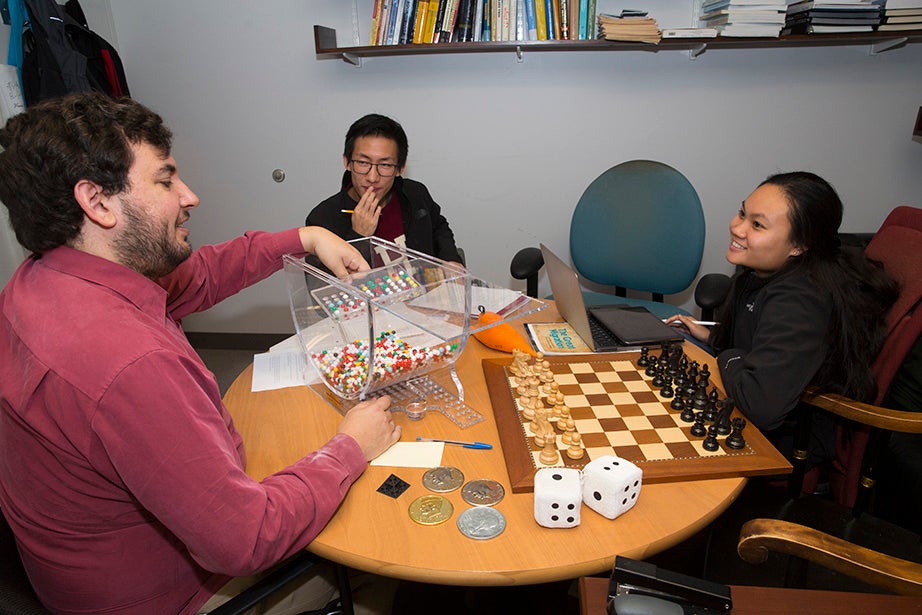
Joe Blitzstein
Professor of the practice in statistics and co-director of undergraduate studies at the Department of Statistics.
Website: Joe Blitzstein
Office: Science Center 714
Office hours arrangement: No appointment necessary during regularly scheduled hours. Individual meetings are scheduled by appointment via email. Use calendly.com to book several individual meetings.
Professors should think carefully about when to schedule office hours, and make sure to be welcoming.
“I have two office hours per week, and each hour typically has five to 10 students if I am teaching a large course.
Office hours are a good opportunity for faculty and students to discuss the material one-on-one (or in small groups), which can be very informative and interesting for everyone. Conversations often also go beyond the course material into how the ideas are connected to other fields and applicable to the student’s long-term goals.
There could be many reasons for students not to come to office hours. For example, they could be at a time the student can’t attend (people tend to have very packed schedules here), or the student may not feel they have questions (they may feel they understand the material, or may be confused about some material but not be sure what to ask), or they may think it’s somewhat intimidating, or they may be getting plenty of help in various other ways.
Professors should think carefully about when to schedule office hours, and make sure to be welcoming.”
* * *
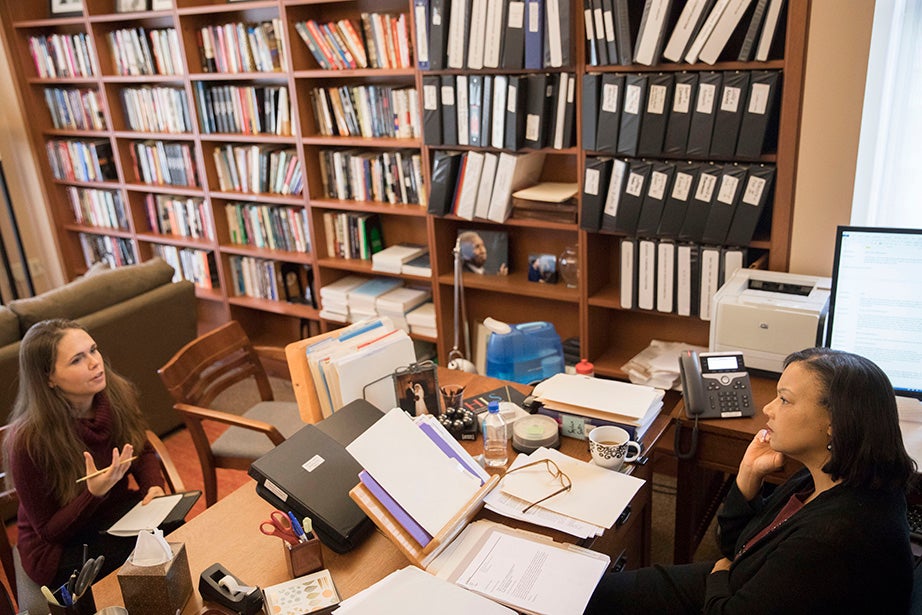
Tomiko Brown-Nagin
Daniel P.S. Paul Professor of Constitutional Law at Harvard Law School, professor of history in the Faculty of Arts and Sciences, co-director of the Law School’s Program in Law and History, and faculty director of the Charles Hamilton Houston Institute for Race & Justice.
Website: Tomiko Brown-Nagin
Office: Hauser 310
Office hours arrangement: Regular drop-in hours and by appointment via e-mail.
Interpersonal interaction in less-formal settings can result in greater understanding of concepts taught in class.
“I am not teaching this semester. But when I do, I would say that between three to five students visit my office hours on a regular basis. These students tend to be the ones who already are engaged in class and are doing well.
I strongly encourage all of my students to visit during office hours because interpersonal interaction in less-formal settings can result in greater understanding of concepts taught in class. These interactions also can help put students at ease in class and therefore result in more and better classroom engagement. Of course, whether, in fact, office hours are beneficial in such ways depends on the personalities and emotional intelligence of particular students and professors.
While I cannot be sure, I would imagine that office hours are underutilized because students find professors intimidating or inaccessible, for fear that they have nothing important to say to professors, and/or because students do not see the value of interacting with professors outside of the classroom.
In the weeks just before Constitutional Law exams, probably half the class will visit office hours. In order to increase student use of office hours before the exam period, I have toyed with making them mandatory.”
* * *
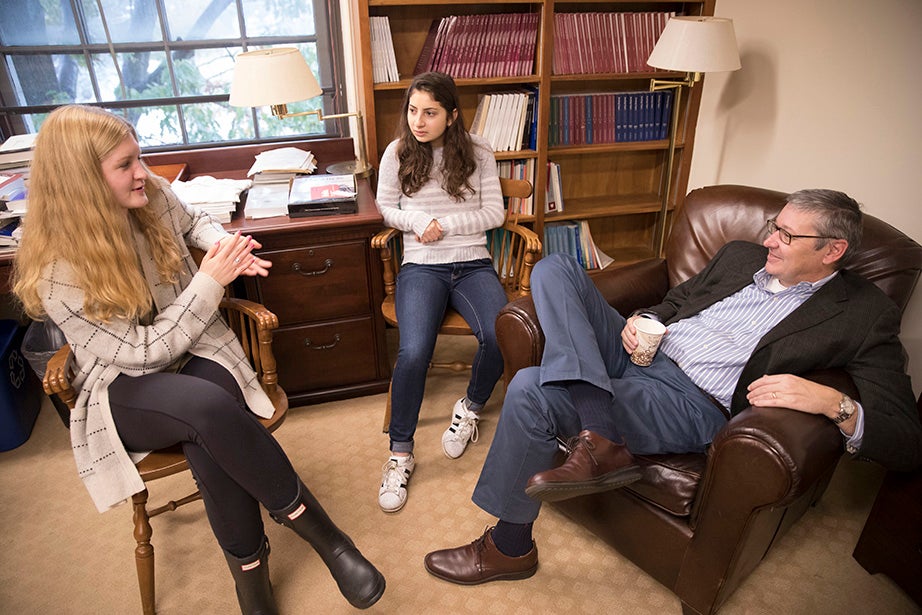
Greg Mankiw
Robert M. Beren Professor of Economics in the Department of Economics.
Website: Greg Mankiw
Office: Littauer Center 223
Office hours arrangement: Regular drop-in office hours. To schedule a meeting outside those, students should email the professor for an appointment.
You don’t need a question to come to office hours. You can just come by to say hello.
“The number of students who come to my office hours varies. I would say about a dozen on average, but Ec10 [the introductory economics course] is a large class. A dozen represents only about 2 percent of the class.
Office hours offer students a chance to have personal interactions with faculty, to discuss how course material fits with other things they are studying, and to get advice about course options and career paths.
Some students don’t come to office hours because they are busy, others because they are intimidated or don’t feel their questions are sufficiently important. I explain to students that you don’t need a question to come to office hours. You can just come by to say hello.”
* * *
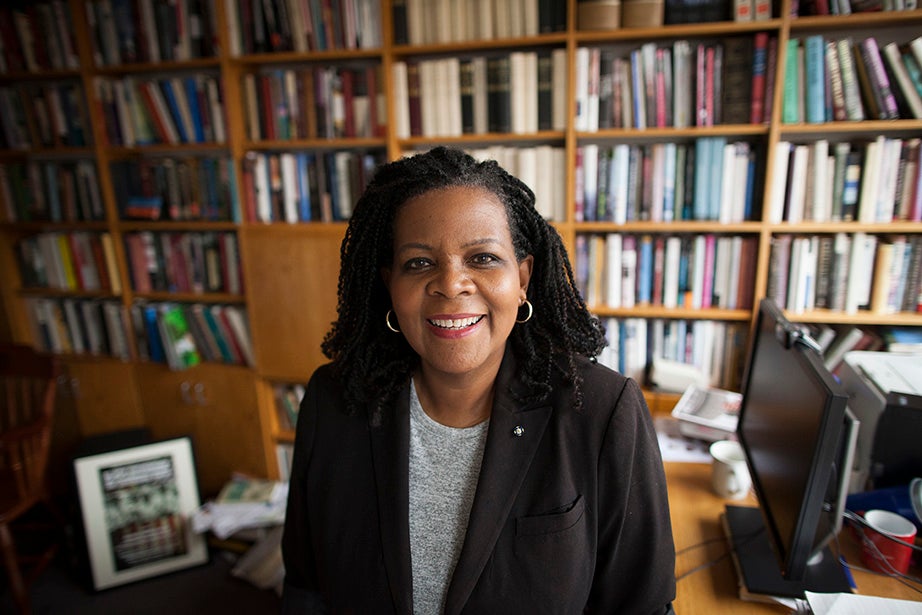
Annette Gordon-Reed
Charles Warren Professor of American Legal History, professor of history in the Faculty of Arts and Sciences.
Website: Annette Gordon-Reed
Office: Griswold 405
Office hours arrangement: By appointment via email.
Professors can be a resource, and students should take advantage of all the resources the University has to offer.
“Students tend to come near the end of the semester when they are getting ready for the exam. Visits earlier in the semester are more often about career path questions or other life issues.
I tell students to come to talk to me after class and arrange a time to meet if they have things they want to talk about.
I try to emphasize that it’s good for students to come to talk to professors, and that they are welcome. I think it makes the school less mysterious if you know both other students and professors. There will be many instances, depending upon what field students go into, when it will be important to have references from people who can speak about a student other than having given them a grade. Professors can be a resource, and students should take advantage of all the resources the University has to offer.”
* * *
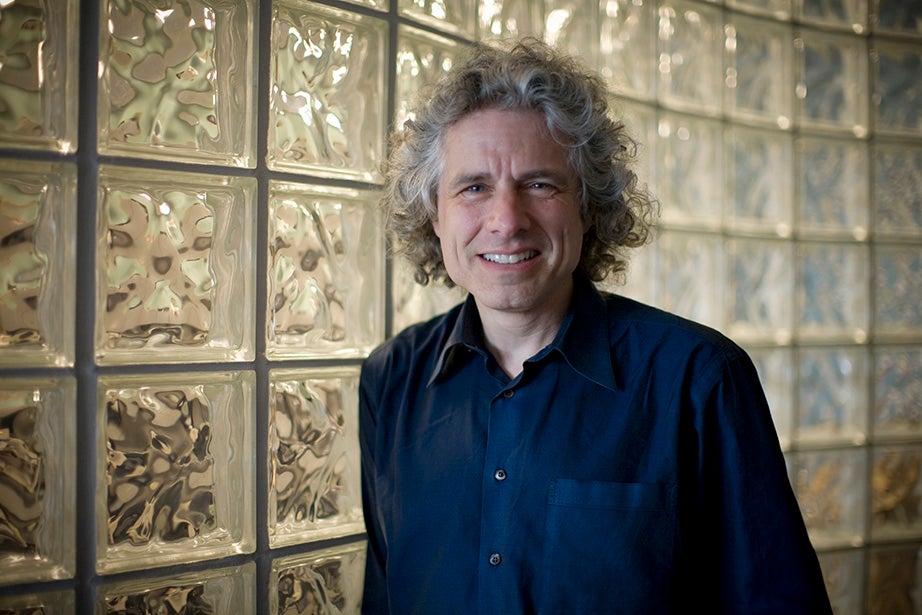
Steven Pinker
Johnstone Family Professor of Psychology in the Department of Psychology.
Website: Steven Pinker
Office: 970 William James Hall
Office hours arrangement: By appointment via email. (He is on sabbatical this year.)
Office hours matter: to explore ideas in greater depth than what’s possible in a lecture hall; to confirm understanding.
“Few students come to office hours — often none, though some years there is a nice group of three to five who come every week.
Frankly I don’t understand why more students don’t show up. The hours are listed in the syllabus, and I also make individual appointments with any student who requests one. It’s part of the general attitude in the College that classes are just one part, for many a minor part, of the Harvard experience. Extracurriculars and networking with other students come first.
Office hours matter: to explore ideas in greater depth than what’s possible in a lecture hall; to confirm understanding; to look behind the scenes in the generation of knowledge.
I wish I knew what professors can do to persuade students to come to office hours! As I mentioned, a change in the College culture in which academics is given greater weight would be a start.”




